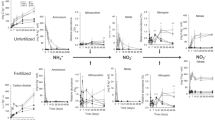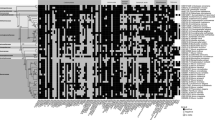Abstract
SINCE the discovery by Starkey and De1 of the soil bacterium Azotobacter indicum, which is capable of fixing atmospheric nitrogen under acid conditions, many unsuccessful attempts have been made to isolate this species from acid soils in western Europe. In one such attempt, preliminary experiments had suggested that the soil of a Betula–Calluna heath in Kent contained organisms able to fix atmospheric nitrogen, but attempts to isolate these organisms by the ‘still culture’ enrichment method failed. This method is not suited to the isolation of organisms present in acid soil in very small numbers: for such organisms continuous perfusion of a large volume of soil with selective media is a far superior method.
This is a preview of subscription content, access via your institution
Access options
Subscribe to this journal
Receive 51 print issues and online access
$199.00 per year
only $3.90 per issue
Buy this article
- Purchase on Springer Link
- Instant access to full article PDF
Prices may be subject to local taxes which are calculated during checkout
Similar content being viewed by others
References
Starkey, R. L., and De, P. K., Soil Sci., 47, 329 (1939).
Author information
Authors and Affiliations
Rights and permissions
About this article
Cite this article
METCALFE, G., CHAYEN, S. Nitrogen Fixation by Soil Yeasts. Nature 174, 841–842 (1954). https://doi.org/10.1038/174841b0
Issue Date:
DOI: https://doi.org/10.1038/174841b0
This article is cited by
-
Nitrogen fixation associated with a hotspring green alga
Archives of Microbiology (1980)
-
Nitrogen fixation in moulds and yeasts?a reappraisal
Archiv f�r Mikrobiologie (1969)
-
The effects of gaseous environments on the growth and metabolism of fungi
The Botanical Review (1968)
-
Nitrogen contribution from the soil for herbage growth
Plant and Soil (1968)
-
Nitrogen fixation in latosolic soil under grass
Plant and Soil (1963)
Comments
By submitting a comment you agree to abide by our Terms and Community Guidelines. If you find something abusive or that does not comply with our terms or guidelines please flag it as inappropriate.



